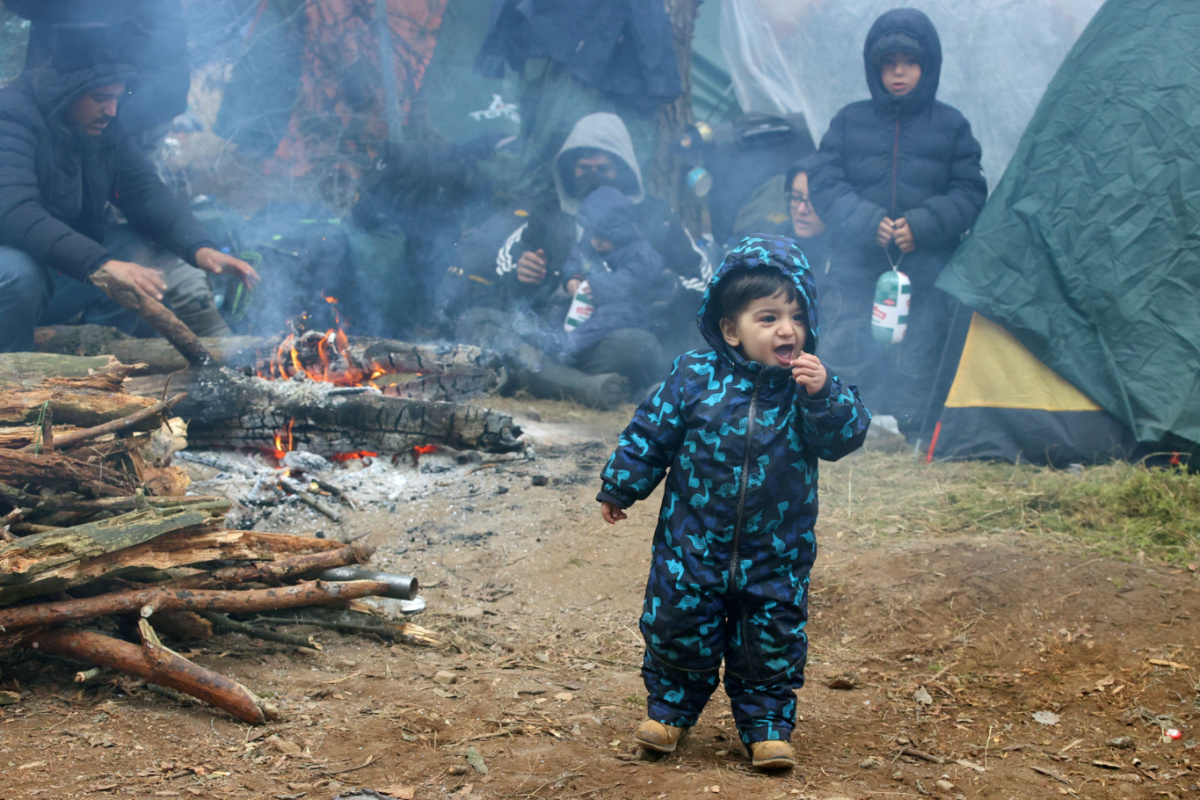Moscow, Russia/Brussels, Belgium
Reuters
The European Union accused Belarus on Wednesday of mounting a “hybrid attack” by pushing migrants across the border into Poland, paving the way for widened sanctions against Minsk in a crisis that threatens to draw in Russia and NATO.
Russia took the rare step of dispatching two nuclear-capable strategic bombers to patrol Belarusian airspace in a show of support for its close ally. Poland briefed fellow NATO allies at a closed-door meeting and they pledged their support, an alliance official said.

Hundreds of migrants camp at the Belarus side of the border with Poland near Kuznica Bialostocka, Poland, in this photograph released by the Polish Defence Ministry, on 10th November. PICTURE: MON/Handout via Reuters.
Migrants from the Middle East, Afghanistan and Africa trapped in Belarus made multiple attempts to force their way into Poland overnight, Warsaw said, announcing that it had reinforced the border with extra guards.
UN human rights chief Michelle Bachelet called on states to de-escalate and resolve the “intolerable” crisis.
“These hundreds of men, women and children must not be forced to spend another night in freezing weather without adequate shelter, food, water and medical care,” she said.
The EU, which has repeatedly sanctioned Belarus for human rights abuses, accuses Minsk of luring migrants from war-torn and impoverished countries and then pushing them to cross into Poland to try to sow violent chaos on the bloc’s eastern flank.
“We are facing a brutal hybrid attack on our EU borders. Belarus is weapon migrants’ distress in a cynical and shocking way,” EU Council President Charles Michel said.
The bloc’s 27 ambassadors agreed this constituted a legal basis for further sanctions, which could come as early as next week and target some 30 individuals and entities including the Belarusian foreign minister and the national airline.
“Very rapidly at the beginning of next week there will be a widening of the sanctions against Belarus,” European Commission President Ursula von der Leyen told reporters after a meeting with US President Joe Biden in Washington.
“We will look into the possibility of sanctioning those airlines who facilitate human trafficking towards Minsk and then the EU-Belarus border,” she added.
Belarusian President Alexander Lukashenko and Russian President Vladimir Putin have pinned the blame on the EU.
The Kremlin accused Europe of failing to live up to its own humanitarian ideals and trying to “strangle” Belarus with plans to close part of the frontier. Moscow said it was unacceptable for the EU to impose sanctions on Belarus over the crisis.
Pressure point
The crisis strikes the EU in a vulnerable area.
In 2015, the bloc was deeply shaken by an influx of over a million people fleeing conflict in Syria, Iraq and Afghanistan that led to deep rifts between member states, strained social security systems and fanned support for far-right parties.
The EU appears more united this time but there are signs of internal friction: some in Brussels have warned Poland that it should not use EU funds to erect border walls and razor wire while others argue the bloc needs to help defend its borders. Michel said on Wednesday the EU needed to make up its mind.

A child reacts as migrants gather in a camp near the Belarusian-Polish border as they attempt to cross it in the Grodno region, Belarus, on 10th November. PICTURE: Leonid Scheglov/BelTA/Handout via Reuters.
Compared with 2015, the current crisis has an added geopolitical dimension as it is unfolding on the dividing line between NATO to the west and Russia-allied Belarus to the east.
The Tupolev Tu-22M3 bombers that Russia sent to overfly Belarus are capable of carrying nuclear missiles, including hypersonic ones of the kind designed to evade sophisticated Western air defences.
Russian Foreign Minister Sergei Lavrov said he hoped responsible Europeans would “not allow themselves to be drawn into a spiral that is fairly dangerous”.
German Chancellor Angela Merkel urged Putin to put pressure on Belarus, a German government spokesperson said. The Kremlin said Putin told her the EU should talk directly to Belarus.
We rely on our readers to fund Sight's work - become a financial supporter today!
For more information, head to our Subscriber's page.
Stranded families
Thousands of people have converged on the border this week, where makeshift razor wire fences and Polish soldiers have repeatedly blocked their entry. Some of the migrants have used logs, spades and other implements to try to break through.
“It was not a calm night. Indeed, there were many attempts to breach the Polish border,” Polish Defence Minister Mariusz Blaszczak told broadcaster PR1.
Video from the border obtained by Reuters showed young children and babies among the people stuck there.
“There are lots of families here with babies between two and four months old. They have not eaten anything for the past three days,” the person who provided the video told Reuters, saying they were a migrant themselves and declining to be identified.
Some migrants have complained of being repeatedly pushed back and forth by Polish and Belarusian border guards, putting them at risk of hypothermia, lack of food and water.
Reuters found ripped up tickets from Middle Eastern airlines, documents from tourist agencies and receipts in the forest near the Polish town of Hajnowka at what appeared to be an abandoned camp site.
Poland’s Prime Minister said the EU needed to block flights from the Middle East to Belarus.
Poland denies accusations by humanitarian groups that it is violating the international right to asylum by hustling migrants back into Belarus instead of accepting their applications for protection. Warsaw says its actions are legal.
– With reporting by ALAN CHARLISH in Suprasl, Poland; KACPER PEMPEL and FELIX HOSKA in Hajnowka, Poland; JOANNA PLUCINSKA, ANNA KOPER and PAWEL FLORKIEWICZ in Warsaw, Poland; ANDRIUS SYTAS in Kapciamiestis, Lithuania; KIRSTI KNOLLE in Berlin, Germany; MARIA KISELYOVA in Moscow, Russia; JEFF MASON and ANDREA SHALAL in Washington DC, US.






